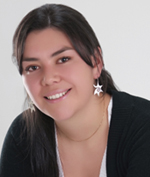Interview with Colombian
scientist Diana Marcela Bolaños
 Diana Marcela Bolaños
did her graduate work on polyclad flatworms with
Marian Litvaitis at the University of New
Hampshire. In 2010, she was awarded a
UNESCO-L'oreal
Fellowship to complete postdoctoral research in
evolutionary developmental biology with
Federico
Brown at the University of Los Andes in Bogotá,
Colombia where she was already a visiting professor. Today,
Bolaños
is an assistant professor in the
Biology Program of the College of Exact and Natural
Sciences at the Universidad de Cartagena
in Colombia where she teaches cell and developmental
biology.
She recently participated in the
2012 SDB-LASDB PASI Short
Course in Montevideo, Uruguay. Diana Marcela Bolaños
did her graduate work on polyclad flatworms with
Marian Litvaitis at the University of New
Hampshire. In 2010, she was awarded a
UNESCO-L'oreal
Fellowship to complete postdoctoral research in
evolutionary developmental biology with
Federico
Brown at the University of Los Andes in Bogotá,
Colombia where she was already a visiting professor. Today,
Bolaños
is an assistant professor in the
Biology Program of the College of Exact and Natural
Sciences at the Universidad de Cartagena
in Colombia where she teaches cell and developmental
biology.
She recently participated in the
2012 SDB-LASDB PASI Short
Course in Montevideo, Uruguay.
What motivated you to return to Colombia after
completing your doctorate in the United States?
The main two reasons
to go back to Colombia were family and the poor
situation of science in Colombia. For me it was
especially difficult to be apart [from] my parents,
and I always wanted to live close to them. Although
my husband and daughter are from the USA, I wanted
my parents to be able to spend time with us and
especially for my daughter to grow up with her
grandparents. On the other hand, Colombia lacks
highly skilled scientists. Many Colombians have the
opportunity to earn their PhD internationally, but
unfortunately, because of the few opportunities in
our country they do not return. So in that matter, I
wanted to help the country by filling that gap and
furthering science and research in the country.
Are there
particular challenges that you face doing research
in Colombia compared to the United States?
The main challenge I
face in Colombia is finding support and funding for
research. There are very few entities (private or
public) supporting research and they represent the
only pool of money for all the research in the
country, so they are competitive and insufficient.
Another challenge is the inadequate conditions of
the infrastructure in the universities regarding
laboratories for research.
What is your
current research on?
Currently, I work on
the embryonic development and patterns and processes
of regeneration of marine polyclad flatworms.
Polyclads have the same system of stem cell as the
well known planarians, however, their potential for
regeneration is limited and restricted. I'm trying
to compare and find out what are the molecular
mechanisms of regeneration in polyclads and why they
are different from those in planarians and other
platyhelminths.
Why did you want to
attend the SDB-LASDB PASI short course?
I wanted to attend
to the course because I'm not a developmental
biologist but my current research involves this
area. All my research has been about systematics and
phylogeny of polyclads and now I'm trying to address
some questions from an evo-devo point of view. The
course seemed to be a great opportunity for me to be
introduced to this field and to meet excellent
professors and well recognized people in the area to
learn from them and get ideas and feedback about my
research.
What were your
highlights from the course?
I truly found the
entire course to be a highlight, every professor was
absolutely interesting and showed us new things. I
really learned from all of them; but if I have to
pick, I really enjoyed meeting
Walter Gehring and
the lecture by
Detlev Arendt.
Was there one thing you learned that you could
take back and immediately apply to your research?
As I mentioned
before I learned from all the professors and got
good ideas to apply to my research in the future,
but the most immediate application of what I learned
will be the techniques and procedures taught by
Alejandro Sanchez Alvarado regarding planarian
regeneration.
What are your future plans?
Despite having a
faculty position in my home country, I would like to
do a postdoc in the field of developmental biology
to obtain better training in this fascinating
field.
|